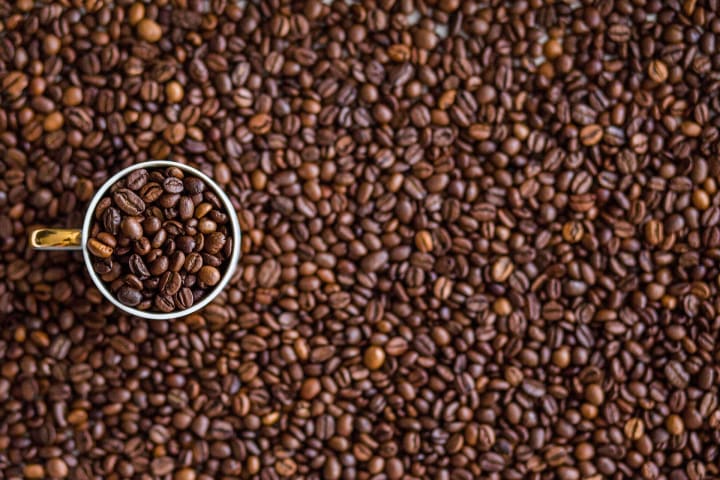Whet are the benefits and harms of coffee?
coffee

Of all kinds, the basic morning drink for most people nowadays; Because it has a refreshing taste, aroma, and stimulation to all human senses. According to the Food and Agriculture Organization, the average annual consumption of coffee around the world is estimated at about seven million tons, and it is drunk in several ways, whether in different regions or even in the country itself.
It is worth noting that different types of coffee differ in their preparation and processing methods. There are many benefits of coffee that have been proven scientifically and in clinical studies, as drinking coffee in specific quantities has a positive effect on the body, but it should also be noted that excessive drinking has an adverse effect on the health of the body, and the person will suffer from anxiety, disorder, or what It is called caffeine intoxication.

The nutritional value of coffee
Coffee contains a lot of substances and nutrients that are a source of the benefits of multiple coffees, and these elements include:
Caffeine: Coffee is one of the richest natural sources of caffeine, which is primarily responsible for the benefits of coffee represented by increasing brain activity and energy levels in the body.
theobromine;
theophylline;
Large amounts of antioxidants that protect against many diseases.
A source of vitamin B1, vitamin B2, vitamin B3 (niacin), vitamin B5, and vitamin E, but in small amounts.
Few minerals such as potassium, magnesium, manganese, phosphorous and folic acid.
Polyphenols, which are the source of many of the health benefits of coffee, such as:
Chlorogenic acid, which helps reduce the absorption of carbohydrates.
Ferulic acid.
Caffeic acid.
Sinapic acid.
Kaempferol (in English: Kaempherol).
Quercetin (in English: Quercetin).
Nicotinic acid.
Trigonelline (in English: Trigonelline).
Quinolic acid.
Tannic acid.
Pyrogallic acid.
The concentrations of these compounds in coffee vary according to; The amount of ground coffee, the coffee preparation process, the quality of the water used in its preparation, and other components.
Nutritional value per 100 ml of coffee:
Calories 2 calories
Calcium 5 mg
Sodium 115 mg
Potassium 116 mg
Magnesium 7 mg
phosphorus 7 mg
Folate 5 mcg
Vitamin B12 0.2 mg
Types of coffee
There are many types of coffee, and it is worth noting that, in general, the benefits of coffee do not differ according to their types. To date, only 120 types of coffee with their different varieties have been mentioned in scientific reports, and these types are:
Arabica coffee or Arabic coffee (in English: Arabica Coffee, Coffea L), which is the most widespread type of coffee around the world, originated in Ethiopia and constitutes about 80% of the world's coffee production.
Robusta Coffee, C. canephora Pierre ex A. Froehner.
Decaffeinated coffee.
Sweet coffee or Turkish coffee.
Decaffeinated coffee
Decaffeinated coffee or Decaf coffee is coffee made from regular coffee beans from which at least 97% of its caffeine content has been removed (which means that it is not completely caffeine-free), before the coffee beans are exposed to any type of processing or roasting. .
Caffeine is removed from coffee in several ways, and it is assumed that the properties and benefits of coffee do not change much after this process, except that the color may change or the taste may become less intense; Depending on the method used to remove the caffeine, this may be more satisfying for people who are unable to tolerate the bitterness or aroma of coffee, or people who are sensitive to caffeine.
Decaffeinated coffee retains the properties of coffee beans, so it provides the body with the same benefits of coffee, except for those of caffeine.
Sweet coffee or Turkish coffee
Sweet or Turkish coffee is a method of preparing coffee that originated in countries in the Middle East and Europe, including Turkey, Iran, and Greece. Since sweet coffee is unfiltered, the concentration of caffeine in it is higher compared to other types.
The benefits of coffee
Adjusting mood, increasing body activity, alerting the mind and feeling alert are among the most important benefits of coffee that everyone who drinks coffee is looking for.
However, studies have shown that there are many other benefits of coffee, as it works to increase the body's immunity, reduce weight, and other positive effects on humans, when drinking it or using it externally.
Here are some of the benefits of coffee:

General benefits of coffee
The benefits of coffee may include:
Increasing brain activity and stimulating memory, because coffee contains caffeine, which is considered a stimulant.
Protecting the individual from developing type 2 diabetes.
Reduce the risk of gallstones, by drinking 4 small cups of coffee.
Reducing the risk of dementia and Alzheimer's.
Reducing the risk of Parkinson's disease.
Reducing the occurrence of vertigo that results from a decrease in pressure after meals, especially in the elderly.
Mood improvement.
Reducing feelings of depression.
Reducing the risk of some types of cancer, including liver cancer, colorectal cancer, kidney cancer, colon cancer, and breast cancer before menopause.
Reducing the risk of strokes, protecting against heart disease, and reducing the risk of high blood pressure if eaten moderately.
Also read: Benefits of green coffee
Benefits of coffee for hair
One of the proven benefits of coffee is its ability to maintain the natural pH of the scalp, thus maintaining the integrity and healthy glow of hair. In addition to using it as a natural hair dye to increase the intensity of the brown color in the hair.
Benefits of coffee for the skin
Coffee contributes to preventing many skin disorders, such as reducing wrinkles and pigmentation, and improving the overall appearance of the skin. Coffee has also become one of the most important exfoliants for the skin today, because one of the benefits of coffee for the skin is that it:
Helps reduce puffiness around the eyes.
Reduce cellulite.
Helps treat acne.
Protects the skin from ultraviolet rays because it contains antioxidants.
For more: the cosmetic benefits of coffee for the face and hair
Benefits of coffee for slimming
The caffeine in coffee increases the secretion of the hormone epinephrine, which in turn stimulates the breakdown of stored fats in the body, in addition to the role of caffeine in increasing the rates of metabolism, which helps to enhance the benefits of coffee in getting rid of excess weight.
The benefits of coffee for weight loss and slimming
Benefits of sweet coffee or Turkish coffee
Sweet coffee may be distinguished from other types of coffee by:
Its ability to improve athletic performance due to its high caffeine content.
Because it is unfiltered, it contains higher levels of beneficial compounds found in other types of coffee. Coffee beans contain beneficial compounds such as chlorogenic acids, which provide health benefits such as reducing inflammation, controlling blood sugar and cholesterol levels, and high blood pressure.
They contain diterpenoids, which may reduce inflammation, fight infection, and support heart health.
Turkish coffee is often made with cardamom, a flavorful spice that has been linked to several health benefits. For example, cardamom contains powerful antioxidants that can help reduce inflammation and thus reduce the risk of chronic disease.
Benefits of decaffeinated coffee
Benefits of decaffeinated coffee may include:
Reducing the risk of diabetes.
Protecting the liver from toxicity.
Maintaining the health of the cardiovascular system, by preserving the health of the lining of blood vessels that work to expand and narrow the vessels better; This ensures that the right amount of oxygen and nutrient-rich blood is supplied to all parts of the body.
Enhancing brain functions, reducing the risk of dementia, neurodegenerative diseases (such as Alzheimer's and Parkinson's disease), and protecting against mental decline as a result of aging.
Also read:
Benefits of Arabic coffee
Benefits of coffee with milk
Coffee damage
Despite the aforementioned benefits of coffee, there are many harms when drinking excessively, and these harms include the following:
Increased feelings of anxiety and stress, and increased nervousness in some individuals.
Increasing the time the body needs to fall asleep, i.e. insomnia and sleep problems.
Indigestion, vomiting, or heartburn in people with coffee sensitivity.
Diarrhea or loose stools, which result from increased bowel movements.
Exacerbation of gastroesophageal reflux disease.
Coffee addiction.
High blood pressure and increased heart rate.
Needing to urinate frequently.
Increased incidence of urinary incontinence.
Drought.
Increased risk of acne and wrinkles.
Slowing down the wound healing process, and decreasing the skin's ability to produce collagen.
Increased risk of miscarriage, premature birth, or low birth weight.
Increased bowel activity, trouble sleeping, or irritability in infants if a breastfeeding mother drinks too much coffee.
Yellow discoloration of the teeth.
Hyperactivity, difficulty sleeping, and stomach problems when children drink coffee in large quantities.
The effect of coffee on the heart muscle and blood vessels

Cases in which you should stop drinking coffee
There are cases in which doctors advise coffee consumers to reduce or stop drinking coffee altogether, in order to reduce the harms of coffee, and these cases include:
Patients with high blood pressure and cholesterol.
Stomach ulcer patients.
Patients with anxiety, sleep problems.
pregnant woman.
People who take some medications that interfere with the effect of coffee, or that coffee can affect their absorption. Among these drugs are ephedrine, quinolone antibiotics, estrogen pills, antidepressants, levothyroxine, and anticoagulant drugs such as aspirin.
Women in menopause (menstrual cycle), people with osteoporosis, and the elderly are advised to reduce coffee consumption.
Tips and advice about drinking coffee
To get the health benefits of coffee and avoid its potential harms, it is recommended to:
Drinking coffee in a moderate manner, that is, at a rate of two cups as a maximum per day, because this will avoid those who drink it from many health problems, and provide their body with many benefits.
Do not add sugar to coffee to get more benefits from it.
Drinking filtered coffee to get rid of some harmful substances such as cafestol.
Staying away from drinking ready-made coffee, such as what is obtained in cafes; Because it is full of sugar and high calories.
Stop drinking coffee 24 hours before a heart stress test.
Leave a time interval of at least one hour between eating sources of calcium and iron from food and drinking coffee.
Coffee that contains small amounts of caffeine is the most suitable option for pregnant women, provided that the daily amount does not exceed two cups only.






Comments
There are no comments for this story
Be the first to respond and start the conversation.